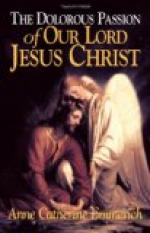To these details we will add the following extract from an account printed in December 1824, in the Journal of Catholic literature of Kerz. This account was written by a person with whom we are unacquainted, but who appears to have been well informed: ’About six or seven weeks after the death of Anne Catherine Emmerich, a report having got about that her body had been stolen away, the grave and coffin were opened in secret, by order of the authorities, in the presence of seven witnesses. They found with surprise not unmixed with joy that corruption had not yet begun its work on the body of the pious maiden. Her features and countenance were smiling like those of a person who is dreaming sweetly. She looked as though she had but just been placed in the coffin, nor did her body exhale any corpse-like smell. It is good to keep the secret of the king, says Jesus the son of Sirach; but it is also good to reveal to the world the greatness of the mercy of God.’
We have been told that a stone has been placed over her grave. We lay upon it these pages; may they contribute to immortalise the memory of a person who has relieved so many pains of soul and body, and that of the spot where her mortal remains lie awaiting the Day of Resurrection.
TO THE READER
Whoever compares the following meditations with the short history of the Last Supper given in the Gospel will discover some slight differences between them. An explanation should be given of this, although it can never be sufficiently impressed upon the reader that these writings have no pretensions whatever to add an iota to Sacred Scripture as interpreted by the Church.
Sister Emmerich saw the events of the Last Supper take place in the following order:— The Paschal Lamb was immolated and prepared in the supper-room; our Lord held a discourse on that occasion—the guests were dressed as travellers, and ate, standing, the lamb and other food prescribed by the law—the cup of wine was twice presented to our Lord, but he did not drink of it the second time; distributing it to his Apostles with these words: I shall drink no more of the fruit of the vine, etc. Then they sat down; Jesus spoke of the traitor; Peter feared lest it should be himself; Judas received from our Lord the piece of bread dipped, which was the sign that it was he; preparations were made for the washing of the feet; Peter strove against his feet being washed; then came the institution of the Holy Eucharist: Judas communicated, and afterwards left the apartment; the oils were consecrated, and instructions given concerning them; Peter and the other Apostles received ordination; our Lord made his final discourse; Peter protested that he would never abandon him; and then the Supper concluded. By adopting this order, it appears, at first, as though it were in contradiction to the passages of St. Matthew (31:29), and of St. Mark (14:26), in which the words: I will drink




